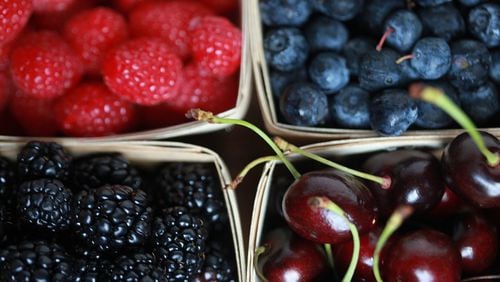Most of us know someone affected by dementia, and if we don't, we worry we will be affected ourselves. Food and the brain is likely to be one of the hot topics for 2018.
Can what you eat make a difference in helping you remember things? If you're feeling forgetful, it could be due to a lack of sleep or several other reasons, including genetics, level of physical activity and lifestyle and environmental factors. However, there's no doubt that diet plays a major role in brain health, according to the Academy of Nutrition and Dietetics.
The best menu for boosting memory and brain function encourages good blood flow to the brain -- much like what you'd eat to nourish and protect your heart. Research has found the Mediterranean Diet helps keep aging brains sharp, and a growing body of evidence links foods such as those in the Mediterranean diet with better cognitive function, memory and alertness.
Here are some foods to add to your diet this year to help with memory recall.
Eat your veggies. You're not likely to forget this message. Getting adequate vegetables, especially cruciferous ones including broccoli, cabbage and dark leafy greens, may help improve memory. Try a kale salad or substitute collard greens for a tortilla in your next sandwich wrap. Broccoli stir-fry also is an excellent option for lunch or dinner.
Be sweet on berries and cherries. Berries -- especially dark ones such as blackberries, blueberries and cherries -- are a rich source of anthocyanins and other flavonoids that may boost memory function. Enjoy a handful of berries for a snack, mixed into cereal or baked into an antioxidant-rich dessert. You can reap these benefits from fresh, frozen or dried berries and cherries.
Get adequate omega-3 fatty acids. Essential for good brain health, omega-3 fatty acids, docosahexaenoic acid, or DHA, in particular, may help improve memory in healthy young adults. Seafood, algae and fatty fish -- including salmon, bluefin tuna, sardines and herring -- are some of the best sources of omega-3 fatty acids. Substitute fish for meat a couple times each week to get a healthy dose. Grill, bake or broil fish for ultimate flavor and nutrition. Try salmon tacos with red cabbage slaw, snack on sardines or enjoy seared tuna on salad greens for dinner. nutritionist. You can get omega-3 fatty acids from fish oil, seaweed or microalgae supplements.
Work in walnuts. Well known for a positive impact on heart health, walnuts also may improve cognitive function. Snack on a handful of walnuts to satisfy midday hunger, add them to oatmeal or a salad for crunch or mix them into a vegetable stir-fry for extra protein.
These foods are not just good for the brain, they sustain a healthy heart and all parts of the body. While there's no guarantee that these foods will help you remember where you put your keys tomorrow, over time they can support lifelong good health.
Q and A
Q: Does protein help build muscle strength and limit age-related muscle loss in older men?
A: An analysis of 17 clinical trials involving people over 60 (average age 73) found that older men should consume extra protein after doing strength-building exercise. The analysis was published in the American Journal of Clinical Nutrition. Most studies lasted 12 to 24 weeks; the amount of extra protein ranged from 10 to 35 grams, usually in the form of whey or milk protein or milk-based beverages and the strength training regimens varied. While extra protein had a significant effect on exercise-induced muscle gain in men, this was not seen in women. Not surprisingly, greater muscle gains were seen in longer studies that involved training multiple body parts. Milk has 8 grams of protein per cup, yogurt 10 to 20 grams per cup (Greek yogurt has the most). Since high protein consumption can worsen chronic kidney disease, check with your doctor before upping your intake. - University of California, Berkeley Wellness Letter.
About the Author






